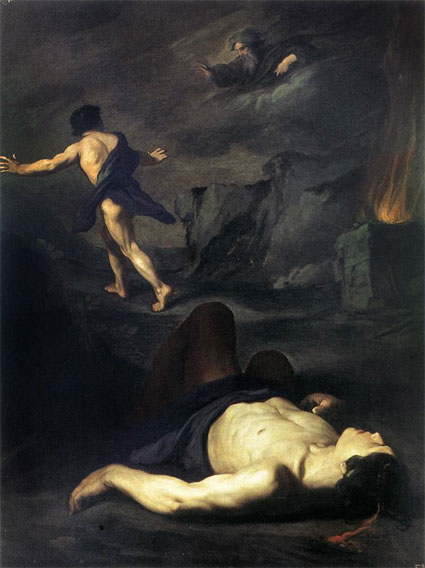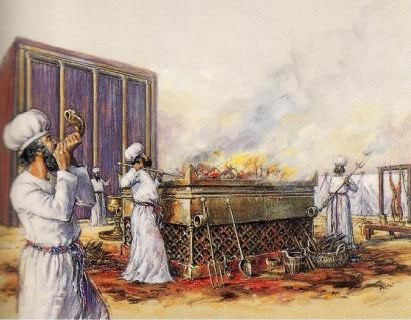Apr
16
2009
…let us consider one another in order to stir up love and good works, not forsaking the assembling of ourselves together, as is the manner of some, but exhorting one another, and so much the more as you see the Day approaching… you have need of endurance, so that after you have done the will of God, you may receive the promise: “For yet a little while, and He who is coming will come and will not tarry.”
(Hebrews 10:24-25 and 36-37)
The resurrection that the New Testament writers were looking forward to occurred in the first century. They refer to it as being imminent. Jesus said some who heard His words would see His coming before they died. John would remain alive until Jesus came in judgment. It was the saints receiving the kingdom and being resurrected. Now the church governs the world from heaven, and its heavenly ‘Temple’ pattern is being measured out on the earth.
Continue reading
1 comment | tags: AD70, Against Hyperpreterism, Cain, Genesis, Millennium | posted in Against Hyperpreterism, Biblical Theology
Apr
16
2009
This event would explain the massive discontinuity between the apostles and the church fathers. James Jordan writes:
The true Fathers of the Church are Noah, Abraham, Joseph, Moses, Jeremiah, Jesus, Paul, Peter, and John, and the other Fathers in the Bible. These men, under the guidance of the Holy Spirit, created the apostolic deposit from which the Church always grows. The men who came after them, in the first and second and third centuries, are not Church Fathers but Church Babies. We may think that because these men lived right after the apostles, they must have known a lot. Remarkably, this is not the case. Anyone who reads the Bible, climaxing in the New Testament, and then turns to the “apostolic fathers” of the second century, is amazed at how little these men seem to have known…
Continue reading
Comments Off | tags: AD70, Church Fathers, Church History, Firstfruits, James Jordan, Resurrection | posted in Against Hyperpreterism, Biblical Theology, The Last Days
Apr
16
2009
The Mission
or World Without End?

With all the fuss between hyperpreterism and preterism, is it possible both positions are basically right?
Hyperpreterists realise that the apostles were expecting an immiment resurrection, and the partials have to treat verses inconsistently – applying some to AD70 and some to the end of history. But then the hypers have to squish the millennium into AD70 like a fairground mirror. They believe all prophecy has been fulfilled. Not good.
Continue reading
Comments Off | tags: AD70, Against Hyperpreterism, Hermeneutics, Judgment, Moses | posted in Against Hyperpreterism, Biblical Theology, The Last Days
Apr
16
2009

The Rest of the Dead
I saw the souls of those who had been beheaded for their witness to Jesus and for the word of God, who had not worshiped the beast or his image, and had not received [his] mark on their foreheads or on their hands. And they lived and reigned with Christ for a thousand years. But the rest of the dead did not live again until the thousand years were finished. This is the first resurrection. Revelation 20:4-5
James Jordan writes:
Continue reading
Comments Off | tags: Abel, AD70, Cain, James Jordan, Millennium, Resurrection, Revelation, Temple | posted in Against Hyperpreterism, Biblical Theology, The Last Days, Totus Christus
Apr
16
2009
Garden
Christ reclaimed Adam’s garden and disarmed Satan by dying.
Land
The “son of man” (Christ’s body, the church) reclaimed Abel’s land and disarmed his Canaanite older brother in the Land by dying.
World
With the razing of Cain’s city, Jerusalem, the Christ’s Dominion expanded from Land to World, from brothers to children, from Abel to Seth. As the sons of God, we disarm the “daughters of men” culture around us by dying. We die to our predatory desires, and if necessary, we die physically as a witness. Kingdom expansion is always bought with blood. As with Job, our innocent suffering shames and disarms predatory powers and thus renews the world.
(See also Postmillennial Suffering)
Comments Off | tags: Abel, AD70, Adam, Cain, Canaanites, Crucifixion, Ecclesiology, Martyrdom, Satan, Seth, Totus Christus, Witness | posted in Against Hyperpreterism, Biblical Theology, The Last Days
Apr
15
2009

See to it that you do not refuse him who speaks. If they did not escape when they refused him who warned them on earth, how much less will we, if we turn away from him who warns us from heaven? At that time his voice shook the Land, but now he has promised, “Once more I will shake not only the Land but also the heavens.” The words “once more” indicate the removing of what can be shaken—that is, created things—so that what cannot be shaken may remain. Therefore, since we are receiving a kingdom that cannot be shaken, let us be thankful, and so worship God acceptably with reverence and awe, for our “God is a consuming fire.” Hebrews 12:25-29
The context of Hebrews is AD70. The destruction of Jerusalem meant that the saints had received the kingdom (Daniel 7).
Continue reading
Comments Off | tags: AD70, Altar, Atonement, Azal, Hebrews, Jericho, Passover, Tabernacle | posted in Biblical Theology, The Last Days
Apr
10
2009
Sacramental Doses of Death
Water, fire, salt and wine are symbols of judgment. In small quantities they bring life and keep death at bay (defilement). In large quantities, God uses them to destroy an irredeemable culture:
Syncretised sons of God (Gen 6) – water
Sodom – fire and salt (Gen 18-19)
The old Canaanite world, then Babylon – wine (Jer 25)
 For the church to be “salty” means it brings sound judgment to society. To lose its saltiness is the same as fire not being hot, or water not being cold. If we are not salty, we are lukewarm, and things that should be mortified in the church are not dealt with. Judgment begins at the house of God and flows to the nations.
For the church to be “salty” means it brings sound judgment to society. To lose its saltiness is the same as fire not being hot, or water not being cold. If we are not salty, we are lukewarm, and things that should be mortified in the church are not dealt with. Judgment begins at the house of God and flows to the nations.
In this context, the following words of James Jordan are not so shocking as they might otherwise appear:
The coming of the kingdom always involves the violent destruction of the wicked. When God announced the birth of Isaac, He immediately went out and destroyed Sodom (Genesis 18-19). These events are linked. The rescue of Israel from Egypt entailed the destruction of Egypt. The coming of the Spirit at Pentecost is followed by the slaying of Ananias and Sapphira. The New Covenant brought with it the horrors of AD70.1 Jesus is Kinsman Redeemer/Avenger. In Hebrew, redeem and avenge are the same word: ga’al.
Christians should rejoice at the privilege of bringing holy violence against the wicked and violating their plans and their wicked integrity. In union with Christ, who is both Redeemer and Avenger, Christians have both privileges. Serving in the Church, Christians extend redemption. Serving in the State, Christians extend Vengeance where necessary. The Christian serving as President of the USA should have Osama bin Laden captured and brought to Washington. Then, in front of television cameras from all nations of the world, the Christian President should smilingly blow bin Laden’s brains out, and publicly praise the Triune God for the privilege of doing so. Anyone who disagrees with this has no notion of what his baptism into union with Christ means.
A theology of indiscriminate “non-violence” is pure Satanism. It gives the world to the devil. In Christ we are now adults, and as adults we have grown-up responsibilities. One of those is the joyous privilege of exercising violence against the wicked.2
I have to say, I gulped hard when I first read this. But such a reaction shows how far out of step with Christ we are in our thinking. And such a judgment assumes we are already judging ourselves rightly with sacramental doses of water, fire, salt and wine and not hypocrites. The problem with the world begins with me.
_____________
1 Read Frederick Farrar’s summary here.
2 James B. Jordan, Evil Empire?, Biblical Horizons Newsletter No. 199, September 2008. Subscribe at www.biblicalhorizons.com
Comments Off | tags: AD70, Babylon, Communion, Compromise, Culture, Genesis, James Jordan, Justice, Wisdom | posted in Ethics
Apr
10
2009
“For as often as you eat this bread and drink the cup, you proclaim the Lord’s death until He comes.”
If, as preterists maintain, Jesus came in AD70, why do you celebrate the Lord’s Supper?
To answer as an orthodox preterist (I’m sorry, but ‘partial’ doesn’t work for me), I would mention that the communion is a covenant memorial that reminds God of the covenant. The covenant is the key.
Continue reading
4 comments | tags: AD70, Communion, James Jordan, Peter Leithart, Resurrection, Revelation | posted in Against Hyperpreterism, Biblical Theology, The Last Days
Apr
10
2009
There is a lot of truth in theonomy. But things have changed since the time of Moses. At that point, the church and state were basically one.
After the exile, things were different. The role of the Jews was to be priests within the Gentile state. They no longer had the right to administer capital punishment. When they witnessed faithfully, there was a Jew at the emperor’s right hand, steering the empire for God’s people and their stand for the truth.
By the time of Christ, instead of a Joseph, Daniel or Mordecai, the Jews had a Haman, a Herod. Instead of being a nation of priests, they wanted a king like the Gentiles. This makes Herod even more culpable for his role in the death of Christ, standing (legally) at the right hand of the power.
I believe the church today is exactly the same. The church administers ‘inhouse’ justice through excommunication. When the church is faithful in disciplining itself, and thus witnesses faithfully, it stands side by side with the state in administering capital punishment. Our failure to witness has led to ‘life’ for murderers and death for the innocent.
The Bible is clear on the shedding of innocent blood. A murderer dies to atone for the blood he shed. It is judicial. Correlating capital punishment with abortion is a total misunderstanding of justice.
As in AD70, perhaps all the innocent blood shed in this gospel age will be atoned for by the final generation. The murderers are marked like Cain for now, but Abel’s blood will be atoned for.
Comments Off | tags: Abel, AD70, Atonement, Daniel, Haman, Herod, Joseph, Mordecai, Moses, Theonomy | posted in Ethics
Apr
10
2009
Regarding churches claiming apostolic authority, particularly the Catholic/Protestant divide, something that is overlooked is that worship was centralised on earth but this ended in AD70. It was possible for Satan to roll the political power of Rome into bed with the religious authority of Judaism, and bring both systems down upon all true worship as persecution.
Since that time, the centre of true worship is in heaven. It is now impossible for Satan to corrupt or attack its centre because the new Jerusalem is above. We see this in Revelation 2-3. Not only is the menora now split into seven separate lampstands, the lampstands are in the holy place, seated with Christ.
So, when the Roman church became corrupt, God’s people came out. When protestantism becomes corrupt, God’s people come out. As Christianity declines in the west, it is booming in the southern hemisphere. Satan is bound from mounting an all-out worldwide attack on the church until he is released for a short time, and then only so he can be drawn out of Egypt like Pharaoh to be destroyed.
There is an institutional church, but in her visible form she is only ever local assemblies. The ‘city of God’ is in heaven, incorruptible, unassailable. If her earthly ‘branches’ leave the vine, they wither up. When they have only darkness to share, Jesus snuffs them out. They are no longer ‘the church’ regardless of whether the physical institutions remain.
Magisterially, the church governs from heaven. The new Jerusalem will descend at the end of history, but any attempt at a centralised, earthly city of God before then is doomed to failure, Roman Catholic or otherwise.
Comments Off | tags: AD70, Church History, Ecclesiology, Eschatology, Roman Catholicism | posted in Ethics





























